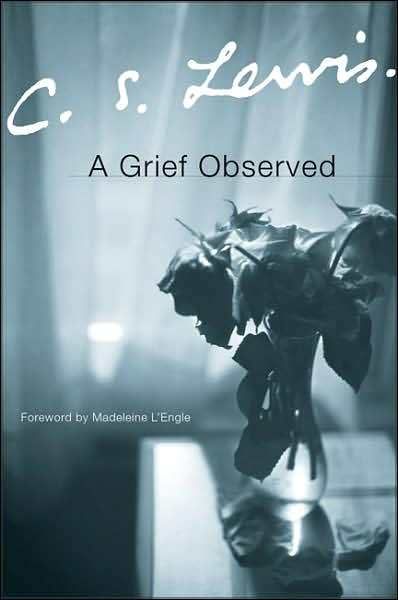
A Grief Observed
A Grief Observed was a diary that Lewis kept of his wife's death after her death of cancer. Lewis was an intellectual and spiritual giant. His apologetics were sound and his mind was sharp as a tack. If anyone knew the answers to everything, it was Lewis.
So what was surprising about this book were the very raw questions Lewis asked in his grief. He asked the "Why?" and "Where were you" questions of God. He lashes out at the cliches of comfort and religion. He rejects intellectual knowledge as a consoler and longs earnestly for answers. One passage I found particularly poignant reads:
If a mother is mourning not for what she has lost but for what her dead child has lost, it is a comfort to believe that the child has not lost the end for which it was created. And it is a comfort to believe that she herself, in losing her chief or only natural happiness, has not lost a greater thing, that she may still hope to 'Glorify God and enjoy Him forever.' A comfort to the God-aimed, eternal spirit within her. But not to her motherhood. The specifically maternal happiness must be written off. Never, in any place or time, will she have her son on her knees, or bathe him, or tell him a story, or plan for his future, or see her grandchild.
While the passage itself is actually quite sad, what was of comfort to me in the midst of my grief was the acknowledgment by Lewis of the distinction between the spirit and a woman's "motherhood." I do not agree that motherhood is or should be a woman's primary natural happiness. However, the mere acknowledgment of what is lost in a woman's heart in the loss of a child (or in my case, the loss of a hope for a child) was as comforting to me as the warm embrace of a friend who understood my grief.
There is nothing "pretty" about Lewis' struggle. His grief is unfettered, undisguised and unashamed. He dares ask if God is indeed a Cosmic Sadist, rather than the picture of goodness we have come to adore. He talks about the "fear" and the "mad words, the bitter resentment, the fluttering in the stomach, the nightmare unreality, the wallowed-in tears" of what he calls the "hells of young grief." His visual imagery of standing, pounding on a closed door that has been double bolted shut communicates the vast depth of his anguish and is a sentiment in which I found commonality with my own feelings and my own locked door. What of God? Was He ever behind the door? Why is He silent to the cries that the door be opened?
Eventually, Lewis comes full circle and back to His God. His broken heart is not mended but His hope for a Good God is restored. He writes,
The terrible thing is that a perfectly good God is in this matter hardly less formidable than a Cosmic Sadist. The more we believe that God hurts only to heal, the less we can believe that there is any use in begging for tenderness...Suppose that what you are up against is a surgeon whose intentions are wholly good. The kinder and more conscientious he is, the more inexorably he will go on cutting. If he yielded to your entreaties, if he stopped before the operation was complete, all the pain up to that point would have been useless.
I found the glimpse in to Lewis' walk to be freeing and empowering. No longer did I feel bound by the self-imposed restriction that "Good/Strong/Knowledgeable Christians don't question God. I no longer plagued myself with the guilty thoughts of "if I was a better Christian, I wouldn't be asking these questions." The fact that he, a stronger, better, smarter Christian than I will likely ever be, asked the same bereft questions of our same, big God.
I also found his words to be helpful as I tried to form my own thoughts and grief. So many times he articulated what I was unable to express. There is much comfort in thinking "aha, someone gets it."
However, I also appreciate the fact that Lewis does not allow himself, or consequently his reader, to stop the process mid-cycle, and to abandon God and hope and goodness prematurely. His intellectual honesty forces him to exam the character of God and the nature of grief and draw conclusions that may be hard for the heart to accept in the midst of its grief, but that are True nonetheless. Lewis does not use his grief as an excuse to write off God for failure to exact Lewis' will instead of His own perfect one. To someone early in the grief process, seeing Lewis come full circle is a glimmer of hope, a light at the end of a dark tunnel.
With a little mental alteration of the context of the book, I think this would be helpful for anyone on this journey, especially those new and/or deep in their grief. The book is challenging and inspiring, difficult and comforting.
Overall rating: 5 stars


